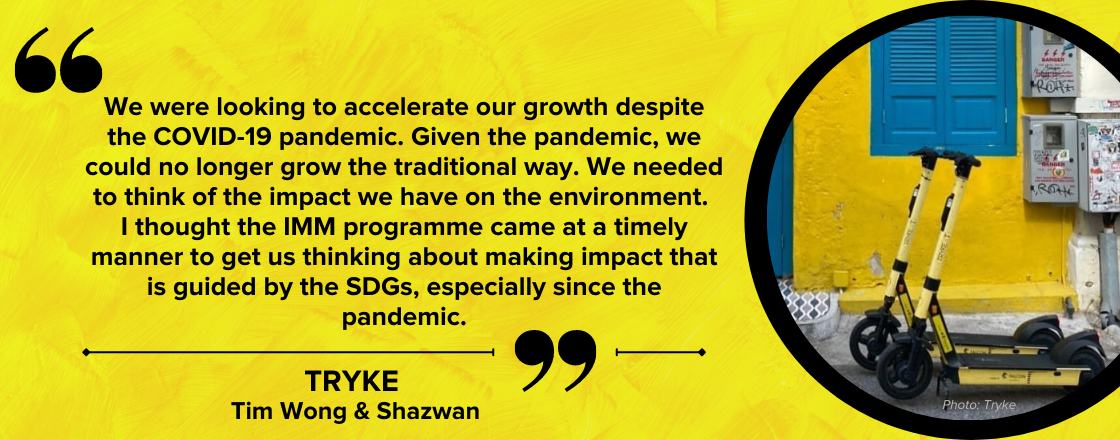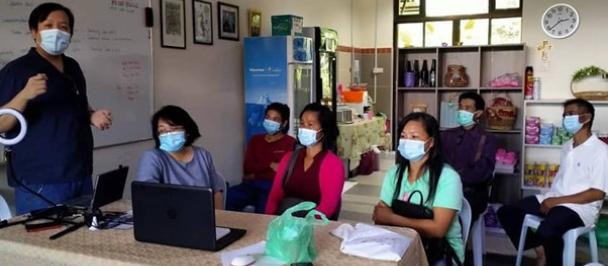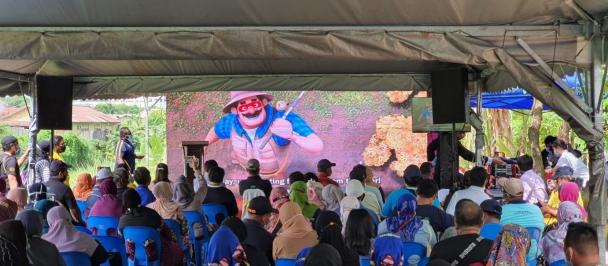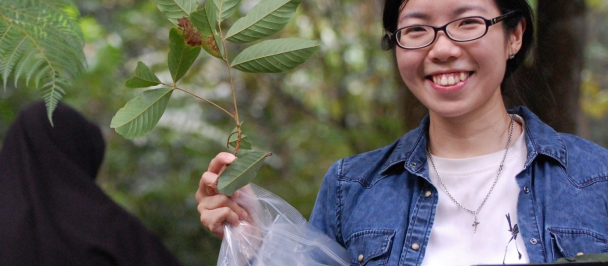by Suzanne Ong, Data Analyst Consultant with UNDP Accelerator Lab
There is no denying of frontier technology innovations’ impact on climate change, society, and inequality levels, as highlighted in the Shaping the Trends of Our Time report by the UN Economist Network. Disruptions imposed by the COVID-19 pandemic and the increasingly inter-connected nature of business challenges have spurred ventures and investors to understand the multitude of social and environmental impacts of their technology solutions. Ventures that offer multiple benefits for society through their products and services are more resilient to external shocks. Moreover, measurable impacts offer better accountability and increase business credibility.
With that context in mind, UNDP in Malaysia and the Malaysian Global Innovation and Creativity Centre (MaGIC) jointly embarked on the first ever pilot for Impact Measurement and Management (IMM) Programme as part of the National Technology Innovation Sandbox (NTIS) initiative. The NTIS programme catalyzes locally driven sustainable innovations to meet Malaysia’s socio-economic needs, while also providing opportunities for ventures to scale up to regional markets. NTIS-UNDP IMM Programme boosts ventures abilities to identify and communicate the impact of their business activities on people and the planet.
I sat down with Chong Yin Wei, Head of Solutions Mapping, to recap the 8-week Impact Measurement and Management (IMM) training programme and the excitement of the Demo Day pitches.
The NTIS-UNDP Impact Measurement and Management Programme Demo Day has just concluded. Who were the ventures that pitched their solutions?
These innovative pitches came from eight Malaysian ventures tackling Energy, Environmental, or Smart Cities and Mobility issues. These ventures were competitively shortlisted from the NTIS cohort of 403 applicants to undergo IMM training from 8 September to 30 October 2021, prior to this Demo Day pitch.
You mentioned Environmental solutions and there has been greater attention towards environmental issues lately. How do ventures tackle Environmental needs?
Indeed, according to the World Economic Forum Global Risk Report 2021, the dominance of environmental risks this year reflected a shift away from the previously dominant economic risks of 10 years ago. This calls for businesses to pivot towards environmental solutions to ensure sustainable economic development and long-term societal resilience.
Among the pool of technological solutions, we saw three ventures which innovatively addressed environmental needs by tackling greenhouse gasses and promoting circular economy. For example, Gogreen Protec Sdn Bhd is a venture that is prototyping a greenhouse gas and air pollution neutralizer, while Klean has developed smart AI-driven reverse vending ecosystem that incentivizes people to recycle. Akar Indah Engineering on the other hand, uses an autonomous robot to collect and manage waste in market or malls following specified routes and schedules through vision-based mapping.
Interesting! What about Energy solutions?
Malaysia has abundant solar resources, and two of the three Energy solutions were related to solar technology, while the other venture focused on enhancing battery life. EPC blockchain is a block-chain-based green investment and financing platform that allows organizations to do solar leasing or receives funding from public crowdfunding and investment funds to finance energy projects and empower the masses to mitigate climate change. SOLS Energy builds microgrids to enable apartment owners to access solar energy. Whereas Renewcell can double the lifespan of batteries using state-of-the-art technology and monitoring performance through an IoT integrated application.
Those sound promising. Can you share some examples of Smart Cities and Mobility solutions?
Certainly, Smart Cities and Mobility are also crucial sectors due to our increasingly urbanized spaces. As such, Green Eklan provides solutions for decentralized smart farming and food security ecosystem. On the other hand, TRYKE (who is the winner of the Best Impact Pitch Award) provides shared electric mobility networks for cities and universities to provide the best mile, that is the cheapest, fastest, and cleanest way to travel short distances.
Sounds like these ventures are doing a lot of good for society. Why do the ventures attend this IMM training?
While these ventures are already bringing interesting business value propositions, the IMM programme enhances their business model by integrating Sustainable Development Goals (SDGs) and Impact Measurement and Management within the venture’s solutions. This enables them to achieve and scale their social and environmental impact more effectively. We expect that the solutions from the sandboxes will be commercialized and grown more sustainably with measurable impact to to people and planet. These ventures may offer insights into models for solutions to be SDG-integrated in achieving SDG 2030 Agenda and Shared Prosperity Vision 2030, and provide good lessons learnt that we could emulate.
I see, so it seems like this is a good opportunity for ventures to be connected to global ambitions and to grow their network. What specifically does the training cover?
Well, UNDP’s Senior IMM Advisor provided valuable guidance on three modules to i) Introduce Impact, ii) Create Impact, and iii) Measure and Pitch Impact. Throughout these modules, participants learned the fundamentals of impact measurement, and applications of the theory of change to achieve their impact goals. By designing and improving the metrics to measure business impacts, ventures will be able to better pitch their business solutions to impact investors. So, with this in mind, ventures were also provided one-on-one mentoring support for IMM and impact pitching.
Business partners from ImpactX, kipleX, SOSV, IRDA, Wavemaker Partners VC, Malaysia GreenTech & Climate Change Centre (MGTC), 500 Global and Hibiscus Petroleum Berhad offered this one-on-one mentorship to participants in two separate sessions. The ventures also completed an IMM Workbook and a data analysis template as a baseline to track progress and growth of the companies going forward. These modules facilitated the ventures preparations for the final Demo Day pitching on 21st October 2021.
It seems that the IMM training has well-equipped ventures to showcase their solutions. What would you say was the greatest benefit of the training? Were there any challenges that were faced?
Initially, ventures faced challenges in aligning company goals with SDG definitions and lacked clear or credible publicly available data to support the reporting indicators. However, towards the completion of training, ventures indicated that their improved impact measurement skills and applying tools to link business solutions to the relevant SDGs in showcasing societal and environment impact were the most common benefit of the program.
Ventures were especially pleased with the quality of input and advice received during the one-on-one mentorship sessions. This greatly improved the substance of their impact pitch and their presentation style.
In addition, the ventures gained a clearer understanding of how their solutions are addressing social or environmental challenges and contributing to the SDGs, while being equipped with the relevant metrics and tools to measure and communicate goals and impact pathways.
In the future, we hope to provide the ventures with better access to potential investors and opportunities for partnerships, especially in testing and scaling impact solutions.
Did you observe any trends about the types of SDG impacts?
At first, ventures were focused on impacts related to greenhouse gas emissions and energy savings. However, through the training, ventures began to consider other areas of growth such as creation of high-valued jobs for communities, and reduction in respiratory diseases due to lower pollution. The programme has also acted as a catalyst for the ventures to understand the interconnectedness of the SDGs and their solution's connections to the wider ecosystem in tackling social development and environmental issues.
The cross-cutting impacts of climate change and growing complexities of development challenges creates an urgency for all businesses, big and small to think creatively on how they are tackling current socio-economic and environment issues in a holistic way.
That’s excellent. So, last question – what’s next on the horizon? What can we look forward to in 2022?
Impact technology is key to meeting Malaysia’s socio-economic needs with long-term sustainability in mind.
Building on this NTIS-UNDP IMM Programme, UNDP Malaysia will continue to explore potential collaborations with NTIS in 2022. We hope to expand the adoption of SDGs and impact measurement practices through the testing and scaling of impact-driven solutions in SDG- theme sandboxes.
We also seek to integrate a wider ecosystem of partners including private sectors, public sector, local councils, technologists, academia and civil society groups to promote an inclusive ecosystem for impact technology.

 Locations
Locations





